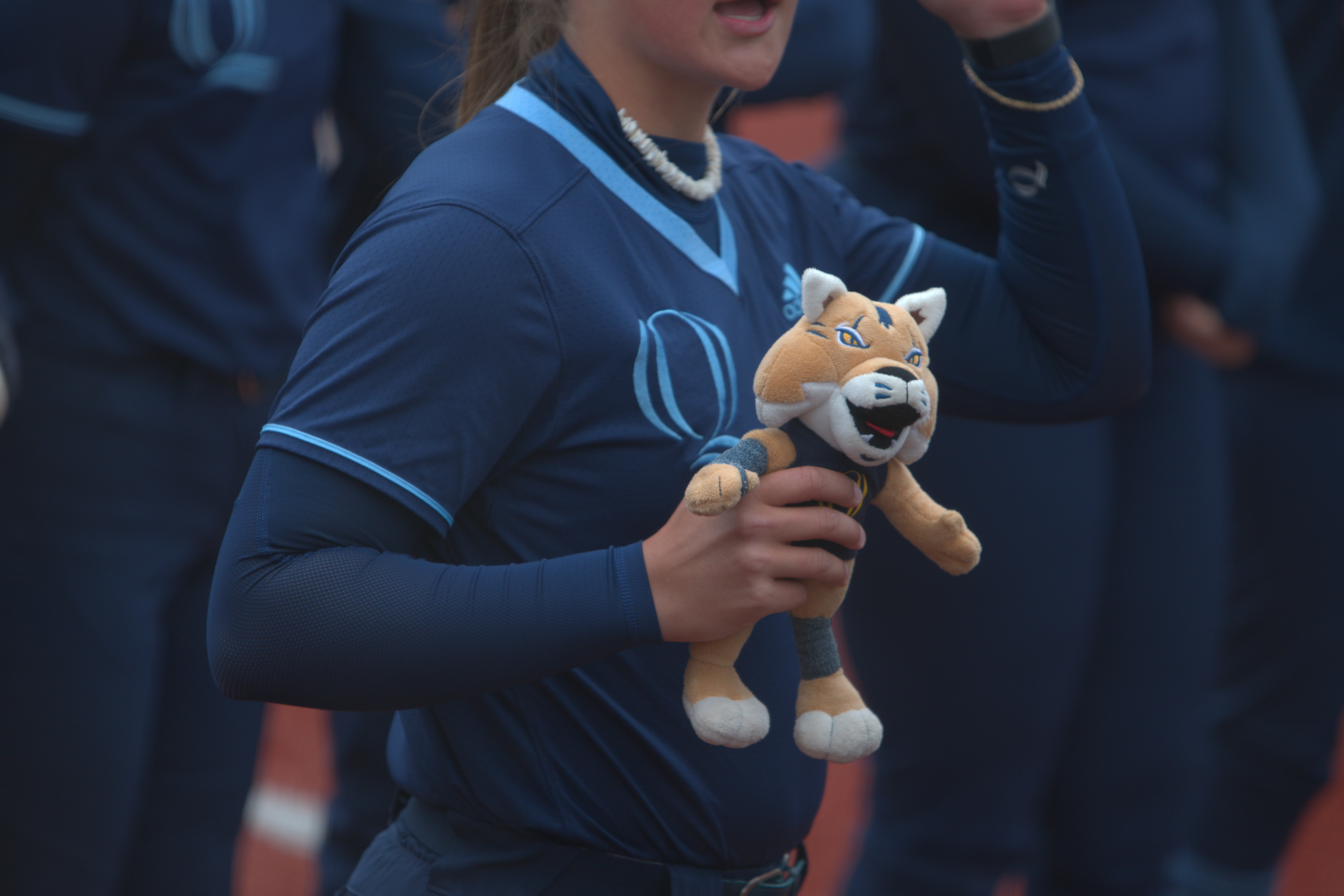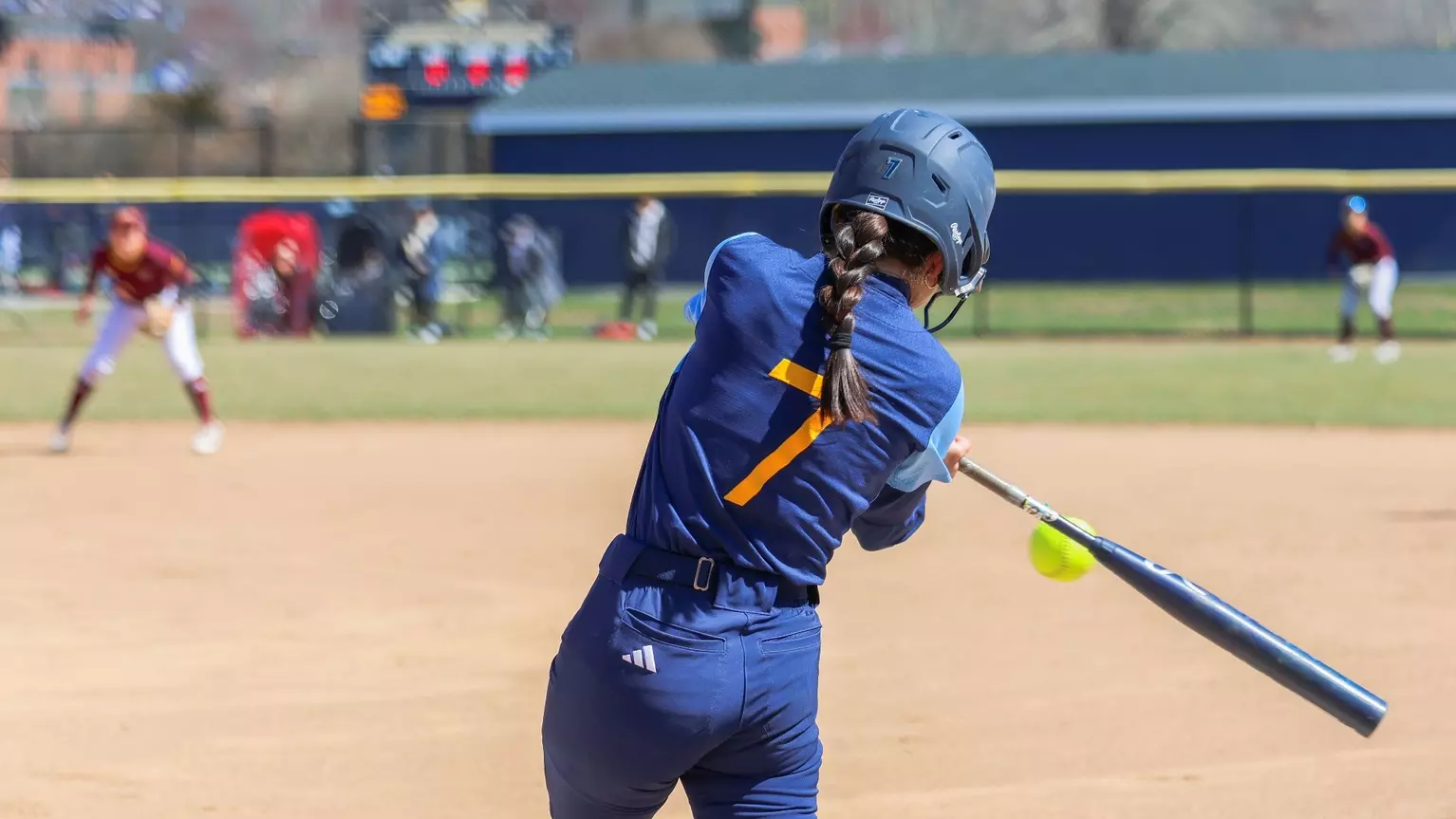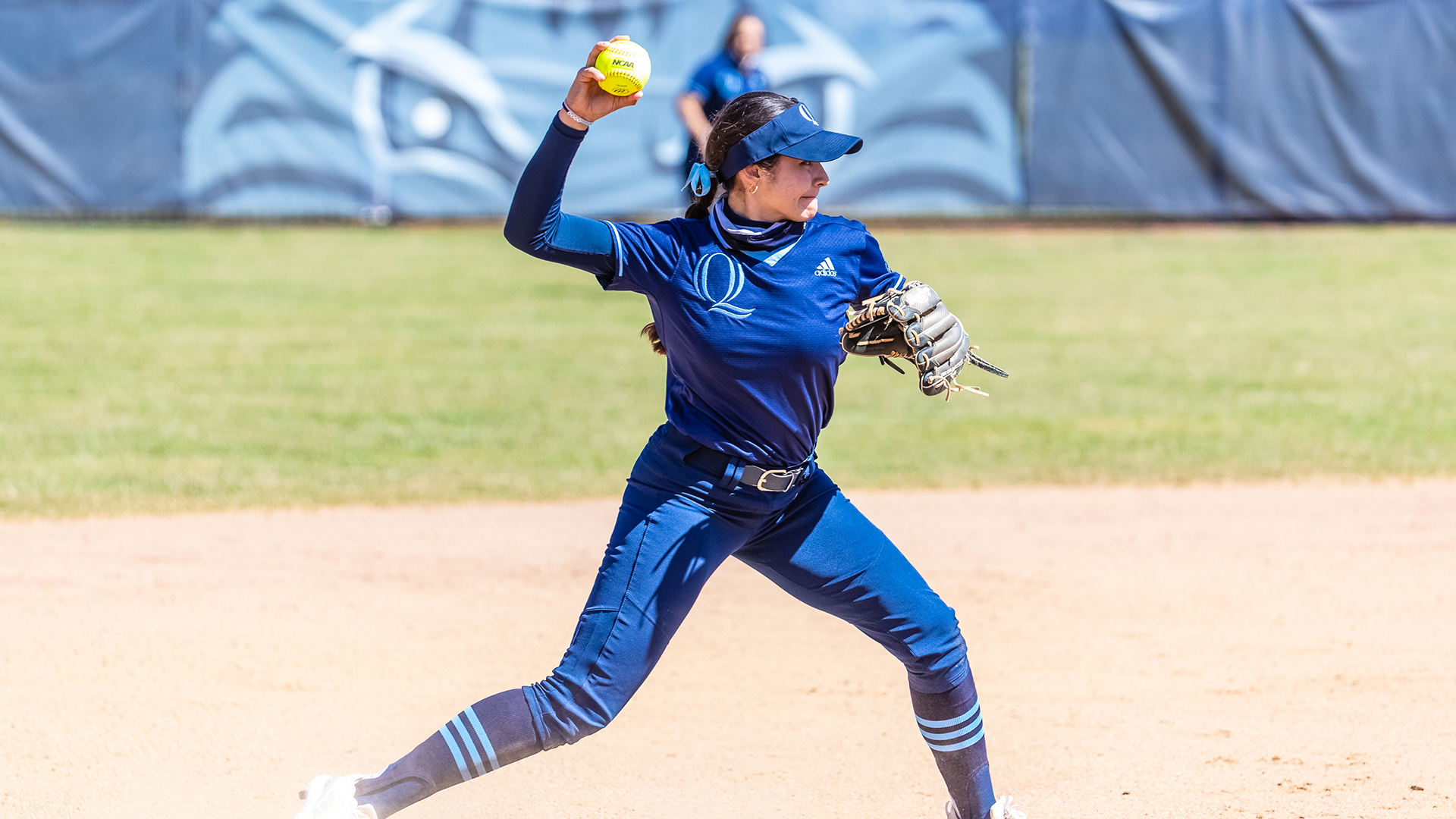Natalia Apatiga just wanted to help.
“I tried to rip the tag off,” the junior infielder admitted.
So fellow infielder Sofia Vega, who leads Quinnipiac softball in RBIs, runs scored, home runs, extra base hits and stolen bases, did what every other person would do when the stuffing started to leak. She ran to grab some athletic training gauze.
The little plush Bobcat doll that sits in Quinnipiac’s dugout, named “Boomie” for being a mini Boomer, was on life support. At this point in time, the Bobcats’ season was — quite literally — bursting at the seams.
“It actually started opening up and everything was falling out,” Vega laughed.
Since his initial injury and ensuing re-tapes from freshman infielder Shannon Kendall and senior pitcher Sydney Horan, the miniature Boomer doll has appeared at most of the Bobcats’ games down the stretch as their home run accessory, silently waiting for a ball to soar over the fence.
Once it does, then it’s his time to shine.
“He’s always with me, so I don’t forget to grab him,” Kendall said. “When I’m throwing in the outfield, he’s with me. When we’re in between innings, like when I’m watching Syd pitch, he’s with me.”
Kendall sees herself as Boomie’s handler, a title that just came organically. Once one of her teammates, typically Vega (four home runs) or junior catcher Kennedy Demott (three), smacks one over the fence, it’s her job to grab the stuffed bobcat and hoist him in the air at home plate.
The prop — purchased by junior outfielder Mary Fogg’s mother in the university bookstore — made its season debut midway through Quinnipiac’s conference slate. He has been a good luck charm, paraded around ahead of a school record-setting MAAC season. The team forgot to bring him to a mid-week trip to Boston College late in the season, and a 3-0 loss ensured he wouldn’t miss another game.
“I’m one of the most superstitious people ever, everybody on this team would tell you,” said head coach Hillary Smith, who has led Quinnipiac to a program-best 14 MAAC wins. “The second we had that little bobcat and we started winning, we were like, ‘Don’t leave the bobcat anywhere!’ So now, the bobcat’s just superstitious comfort.”
Since his introduction to the team’s celebrations, Boomie has suffered several other injuries. The prop now sports athletic tape on his arm and hand — a nod to some of the team’s injuries. It also doesn’t help that the Bobcats have added throwing their mascot into the air in a hot potato-esque ritual to their pregame repertoire.

The team wouldn’t go as far as to call it a voodoo doll, but it’s starting to look like one.
“Kenny’s thumb right now is broken, and Mary, she broke her hand,” Vega said. “(The doll is) matching with us. So it’s just like, even though we’re injured, we’re just gonna keep (going).”
The softball team isn’t the only team on campus to have utilized a clever celebration prop. The men’s basketball team gives its players of the game a pair of hard hats and work gloves. Last season, whenever a baseball player smacked a home run, a cowboy hat was placed atop their head.
But this year’s softball prop — albeit small, injured and often shoved in between the links of the dugout fence — has provided a jolt of energy to a team that clinched a postseason berth for the first time since 2016.
“It’s kind of a goal to get Boomie,” Horan said. “Obviously (as a pitcher), I’m never gonna get Boomie, but for the hitters, it’s kind of like a fun little game.”
—
The seventh-seeded Bobcats snuck into the postseason, the first time they had advanced to the MAAC playoffs in almost a decade.
With eight teams advancing to the MAAC postseason (and the first time the conference allowed that many teams since 2021), the chance to finally play softball on a bigger scale was on the horizon.
“We got (to have) a short memory,” Smith said. “For us, it’s just focusing on one game at a time.”
The regular season started as wonky as it could get. The campaign kicked off with 17-straight road games, including flights to Florida and Tennessee. Rental cars broke down on the highway, while a dirty hotel in Missouri led to the team dusting and cleaning their own rooms — “a lot of chaos,” Horan admitted.
“Because I’m a senior, I just know how it’s gonna go. I know (we’re) gonna be on the move,” senior pitcher Jackie Gonzalez said. “We’re gonna be moving all the time. It wasn’t really challenging for me to adjust. … The hardest people that feel the effects of it are the freshmen.”
The out-of-conference schedule was grueling. The team was on the road for the opening pitch on February 14 and didn’t suit up for the home opener until March 22. Sporting a 5-12 record returning home had its ups (a win against then-ranked Syracuse) and downs (losing six of seven to begin the year).

“I knew this is where we were going to be,” Smith said. “That’s why we made the preseason schedule that we did for all those power five schools because we wanted to challenge ourselves, because we felt like we were ready for it.”
Players like Vega, Demott, Fogg (an All-MAAC Second Teamer) and freshman infielder Madison Waltke (a member of the All-MAAC Rookie Team) broke out offensively. Strong defense from the infield kept the Bobcats in games. A string of wins against Mount St. Mary’s and Manhattan in April gave hope that a top-four seed and a first-round bye was possible.
By the time the calendar had hit late April, the taste of a potential playoff berth was imminent.
“Being the first team (in a while) to actually do something and succeed has been something that’s been really fun,” Horan said. “It’s exciting to go practice every day with the team and know that you could go pretty far in the tournament.”
Quinnipiac officially clinched the seventh spot, albeit a drop down from the fourth seed it had hoped for, on May 1. Five days later, the team opens its postseason against the sixth-seeded Rider Broncs. The first round is single elimination, so if the Bobcats lose, their dream postseason run is over in just one day.
“To have this opportunity, I just couldn’t end this chapter for them any better way besides winning the tournament,” Smith said. “But just getting there is a bonus for us.”
—
Hillary Smith knows there have been some bad seasons.
She was searching for her first MAAC Tournament appearance with Quinnipiac. After over four years split between Central Florida and Florida International, she coached in a number of conference championships and earned two berths to the NCAA Tournament. But since taking the Bobcats job, it’s been a long string of seasons without any regular season success.
“When I came here, I just had a vision of what I wanted it to be, and Quinnipiac is such a beautiful place and has so many opportunities,” Smith said. “I just felt like we could do it here. So it’s been a long road to get to where we are at. … We worked hard.”
Her voice trembled a bit when she brought up this year’s graduating class. It was the first time anyone around this program had sniffed the playoffs under her tenure. The 19-26 record, though blackened a bit by the three-game skid against Fairfield to close the year, has been the best record the seniors have had in a Quinnipiac uniform.

That group is led by the pitching. Horan’s been among the nation’s most-used pitchers, ending the regular season with the most complete games in the country (27) and ranks tied for third in innings pitched (216.2). It’s a strategy that’s worked and failed at the same time. The All-MAAC Second Teamer has gotten the Bobcats some close wins from the circle, but the sometimes-overworked pitcher had to deal with ankle and neck injuries.
“I actually take it inning by inning,” Horan said. “Having goals for every inning, and then going onto the field and trying to reach those helps me stay focused on what I’m doing. And then I blink and the game’s over. It goes by pretty fast.”
In her stead have been fellow seniors Gonzalez and Taylor Walton — the latter went over a full year without throwing a pitch because of a torn labrum and bicep surgery.
“We know how much we’ve all been through outside of softball, inside of softball,” Gonzalez said. “It feels good to make it to the conference tournament after not being able to make it for the past three years.”
The senior class, one that assistant coach Mandie Perez calls “caring and ready to compete,” is paving the way for the underclassmen, some of whom have now never missed a MAAC Tournament.
Those freshmen make up the meat of the squad. There are nine first-years on the team and the assimilation has been going well for the team. Game-day karaoke sessions on the bus are often the results of wins, and the music selections are usually chosen by either Smith or freshman outfielder Aryn Bombery.
“Aryn and (freshman outfielder) Mia (Rubirosa) had great performances,” Horan said. “They definitely brought the energy on the bus. … You’ll send in requests, that sort of thing. But (Smith) or Aryn are usually on the aux.”
Bombery and the newcomers have three more years of bus ride karaoke and trips around the bases with Boomie. The seniors don’t. That’s why they’re cherishing this final run, potentially the final softball games they ever play.
“We’ve been through everything together,” Gonzalez said. “We’ve climbed mountains. We’ve carried each other up mountains. I love the senior class, and I wouldn’t change it for the world.”
Did you literally carry each other up mountains?
“Yes.”
What mountain?
“Sleeping Giant,” Gonzalez laughed.
—
On April 27, Vega stepped into the batter’s box against Sacred Heart. Heading into the top of the seventh, with the Bobcats trailing 1-0, singles by Bombery and senior outfielder Brooke Hilliard helped break up a lengthy offensive skid for the Bobcats.
“We haven’t been scoring when people are in scoring position,” Vega recalled. “It should be a way more high scoring game for us.”
With Pioneers junior pitcher Sam Kowalski already racking up five strikeouts, the feeling around the park was that Sacred Heart was about to win in the team’s final home game of the year.
The first pitch — an inside pitch that Smith said the team worked on hitting in practice days earlier — fell right into Vega’s sweet spot.
*crack*
Vega watched it fly as she ran to first. The Bobcats’ dugout, most of which was sporting rally visors, leapt up as the ball flew over the left field fence and instantly went to greet her at home.

“I was going nuts, I was screaming so loud,” Smith said postgame. “To see her do that, it was pretty awesome.”
Kendall was quick to grab the doll.
The team, with the addition of the bookstore prop, mobbed its third baseman at home. Half an inning later, the Bobcats finished the comeback win for the ages, their final full-length win of the season (they completed a suspended game against Canisius the next day).
“A team of destiny? I would say so,” Horan said. “We have the potential to be able to go all the way to the MAAC Championship.”
For Vega, her four home runs are a career-best, and the Bobcats’ 12 are the most in a season since they hit 14 in 2022. Certainly a good time to introduce a home run prop.
“At first, I was like, ‘Oh my gosh. This is funny, cute.’ But then, we keep hitting home runs,” Vega said. “It’s actually a thing. Make sure we don’t forget (Boomie). … I think it’s actually gonna be something that we keep passing down and keep passing on.”
So the current Bobcats have a lot of extra eyes on them this postseason. The eyes of the conference, the one that finally sees them crack the playoff barrier. The eyes of the 2016 team, the group that won two games en route to a MAAC semifinal berth.
And the eyes of a plush doll that’s squished into the dugout fence.










